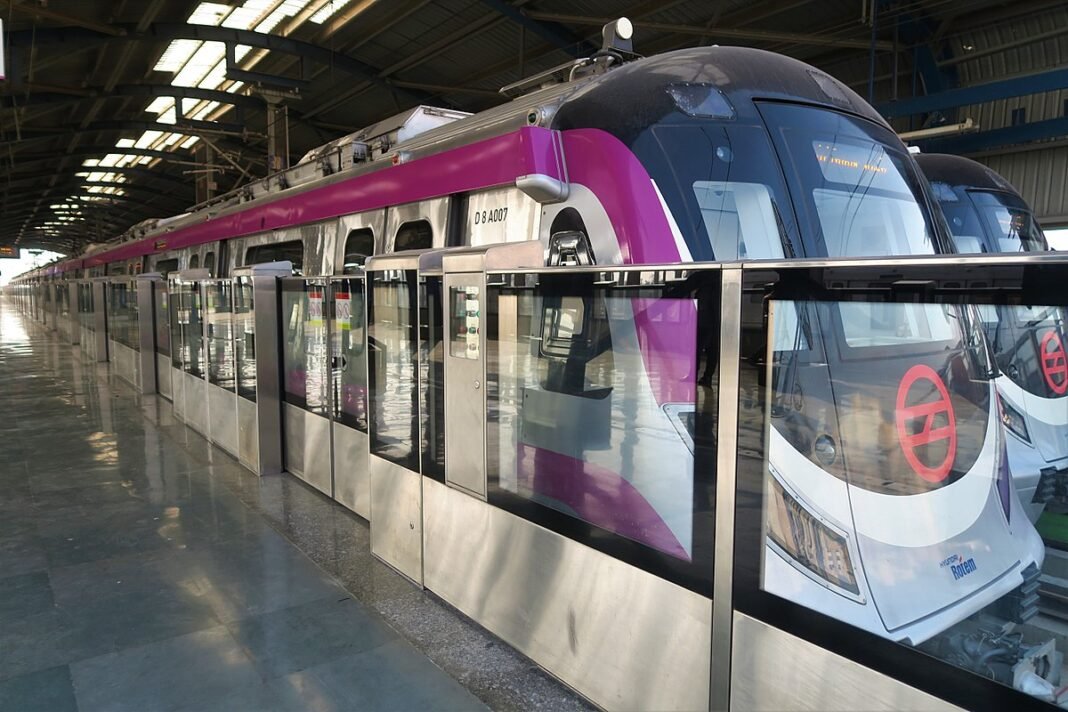Delhi Metro Announces First Fare Hike in Years
The Delhi Metro Rail Corporation (DMRC) on Monday, 25th August 2025, announced an upward revision in metro fares, marking the first hike in several years. The revised fares came into effect immediately, affecting lakhs of daily commuters who rely on the metro as the most convenient and affordable mode of transport in the National Capital Region (NCR). According to the DMRC, the fare increase ranges between ₹1 and ₹4 for regular routes, while the Airport Express line has seen a maximum hike of up to ₹5.
Incremental Fare Hike to Cover Rising Costs
Officials explained that the fare adjustment was essential to meet rising operational expenses, electricity charges, and maintenance costs of one of the busiest metro systems in the world. The Delhi Metro currently caters to more than 60 lakh passengers daily across its extensive network of over 390 kilometers. “The increase has been kept minimal and structured in slabs to ensure commuters face the least possible burden,” DMRC said in its official statement.
Revised Fare Structure Across Routes
Under the new fare chart, short-distance travelers will face an increase of only ₹1, while medium and longer-distance commuters will pay ₹2 to ₹4 extra, depending on the length of their journey. For the premium Airport Express line, which connects New Delhi to Indira Gandhi International Airport, fares have been raised by ₹5 per trip. The new fares are applicable on all metro lines, including Blue, Yellow, Pink, Magenta, and Red.
The revised fares are as follows (approximate ranges):
-
0–2 km: ₹1 hike
-
2–5 km: ₹2 hike
-
5–15 km: ₹3 hike
-
Above 15 km: ₹4 hike
-
Airport Express line: Up to ₹5 hike
Impact on Daily Commuters
For office-goers, students, and regular metro passengers, the fare hike translates into an increase in monthly travel costs. A daily commuter who earlier spent around ₹60 for a two-way journey may now need to pay around ₹64. While the increase appears small on individual trips, frequent travelers could feel the impact on their overall budget.
Some commuters expressed disappointment on social media, pointing out that rising fuel prices, higher bus fares, and now metro fare hikes are squeezing household budgets. Others, however, acknowledged the necessity of the revision, citing the metro’s reliable services, modern infrastructure, and air-conditioned comfort compared to congested alternatives.
The passenger fares of the Delhi Metro services have been revised with effect from today, that is, 25th August 2025 (Monday) onwards. The increase is minimal, ranging from ₹ 1 to ₹ 4 only depending on the distance of travel (upto ₹5 for the Airport Express Line). The new fare… pic.twitter.com/gOgOGmebxz
— Delhi Metro Rail Corporation (@OfficialDMRC) August 25, 2025
DMRC’s Justification and Future Plans
The DMRC highlighted that the fare hike was long overdue, given that the last revision took place years ago. The corporation emphasized that operational costs have increased sharply due to inflation, rising electricity tariffs, and the need for continuous maintenance of trains, stations, and signaling systems.
Officials added that the revenue generated from the fare hike would be reinvested in service improvements, new train sets, better frequency during peak hours, and upgrading infrastructure for passenger comfort. Moreover, DMRC is focusing on greener and more sustainable operations, including the use of solar power and energy-efficient technologies.
Airport Express Line Sees Higher Hike
The Airport Express line, which caters to business travelers, international tourists, and flyers, has seen the steepest hike. Passengers will now pay up to ₹5 more per trip. While this may marginally increase travel costs, the DMRC pointed out that the service still remains cheaper and faster than private taxis and app-based cabs to the airport.
Public Reaction and Government Response
The fare hike has sparked mixed reactions across Delhi-NCR. While some commuter associations have urged the government to roll back the increase or provide subsidies, others believe the decision is justified for long-term service sustainability. The Delhi government, in its initial response, said it would review the fare revision and ensure commuters are not overburdened.
Transport experts noted that despite the hike, Delhi Metro remains one of the most affordable metro services globally, offering world-class facilities at a fraction of the cost compared to cities like London, Tokyo, or New York.
Conclusion: Minimal Yet Necessary Fare Adjustment
The Delhi Metro fare hike, though small, has brought the issue of rising urban transport costs into sharp focus. For millions of commuters, the metro still remains the lifeline of Delhi, offering a safe, reliable, and environment-friendly travel option. While some may grumble at the added expense, experts believe the adjustment was inevitable to keep the metro running smoothly in the years ahead.








